Executive Brief
President & Chief Executive Officer
Encorp Pacific (Canada)
Organizational Profile: Encorp Pacific (Canada)
About Encorp Pacific (Canada)
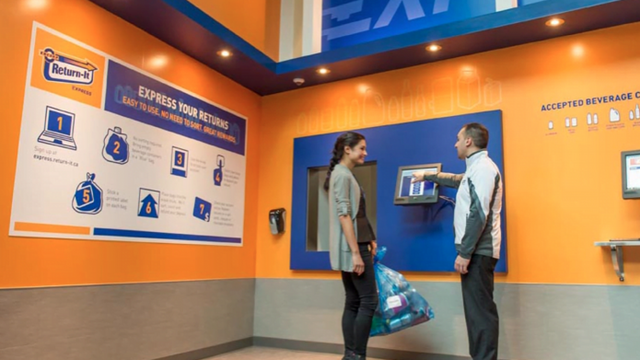
Encorp Pacific (Canada) is a federally incorporated, not-for-profit, industry-owned product stewardship corporation with beverage container management as our core business. Our mandate is to develop, manage and improve systems to recover used packaging and end-of-life products from consumers and ensure that they are properly recycled and not land-filled.
Encorp is committed to establishing good governance and best practices appropriate to an organization of our type. Our Board of Directors consists of representatives of the beverage and retail grocery industries as well as independent directors who have no connection with either industry. A unique feature of Encorp’s governance is the existence of an Advisory Committee which ensures that the Board hears from many of its stakeholders beyond those represented on the Board.
As a not-for-profit corporation Encorp does not pay dividends to the company’s owners but does strive for a prudent level of financial reserves to be used to fund the operations of the company as market conditions require.
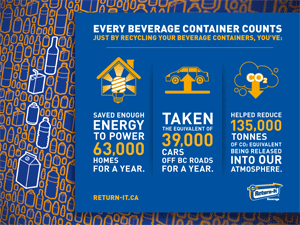
Encorp operates on the basis of several key principles:
- To develop and operate a system which provides consumer-friendly and cost-effective service throughout the province
- To manage the system efficiently to have the lowest impact on consumer shelf prices
- To run a cost-based system in which each product type pays its own expenses with no cross-subsidization from other products or companies
- To divert used products from landfill and incineration
- To maximize the value of the recovered commodities
- To treat all brand owners equitably
Vision, Mission, Social Purpose and Role
Vision
To be the model Industry Product Stewardship organization in a province where every beverage container is recycled.
Mission
To deliver convenient, cost-effective and responsible collection and recycling systems for beverage containers and offer strategic service provision for compatible consumer packaging and end-of-life products.
Social Purpose
We exist to foster a world where nothing is waste.
Role
Our role as a stewardship agency is to facilitate brand owner/producer compliance with the Recycling Regulation by organizing recycling programs from collection and transportation through to final recycling into a variety of end-of-life packaging and products.
Program Outline
The product stewardship model was first set out in a 1997 regulation called the Beverage Container Stewardship Program Regulation (BCSPR).
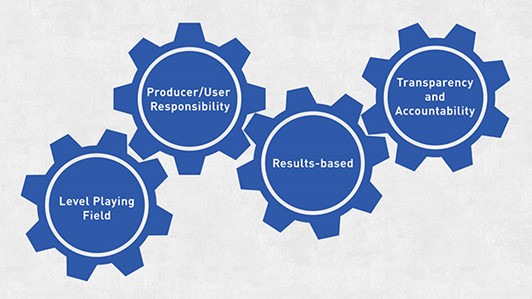
Encorp’s corporate structure, as a federally incorporated not-for-profit organization, was chosen specifically because it meets the requirements of this new style of regulation.
In September 2002, the provincial government further codified the principles to be followed in its Industry Product Stewardship Business Plan. In 2004, these principles were carried forward into the Recycling Regulation that replaced the 1997 beverage regulation and all others that existed at that time. The Recycling Regulation is a “framework” regulation enacted to apply to all extended producer responsibility (EPR) programs in British Columbia. Today, there are upwards of 23 stewardship agencies and 26 EPR programs.
“We exist to foster a world where nothing is waste”
The key principles are:
Producer/User Responsibility – Responsibility for waste management is shifted from general taxpayers to producers and users. Responsibility is not shifted to other levels of government without consent.
Level Playing Field – All brand-owners for a particular product category are subject to the same stewardship responsibilities. Making British Columbia’s system unique, all consumers have reasonable access to product collection facilities.
Results-based – Programs focus on results and provide brand owners flexibility with minimal government involvement. Programs are tailored for individual products and encourage continued innovation by producers to minimize environmental impacts during all stages of the product lifecycle, from product design to end-of-life management.
Transparency and Accountability – The program development process is open and provides all stakeholders the opportunity for input. Industry is accountable to both government and consumers for environmental outcomes and allocation of revenue from fees/levies.
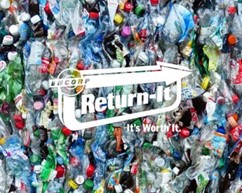
Collection System and Facilities
Encorp’s collection network consists of 163 mainly independently owned and operated Return-It depots, 78 of which offer the “Express” service, which is an increasingly popular way for consumers to simply drop off bags of containers with deposit refunds deposited later into their on-line bank accounts. Encorp also operates 9 Return-It Express & Go depots and 2 Return-It Express Plus depots. Over the past several years, this network has become the backbone for many community- based recycling programs around the province.
Several approved stewardship programs utilize Encorp’s successful Return-It depot network for collecting and managing their recyclables. From electronics and appliances to used paint and motorized yard tools, Encorp’s depots have become the recycling hub of their respective communities.
The stewardship plan sets a standard for depot coverage of 97% of B.C.’s population. Encorp Return-It depots provide services to 98.6% of the British Columbia population and when the beverage retail collection locations are included, coverage increases to 99.4%.
To view the coverage maps, visit return-it.ca/locations/coverage-2016.
Encorp’s integrated transportation system uses 32 transporters to move our material into 13 processing sites throughout the province. Within urban centres, it uses dedicated transporters that pick up from depots, retailers and other collection sites. In rural areas, Encorp utilizes transporters that provide back-hauling resulting in environmental, logistical and financial savings.
Encorp is responsible for managing a large volume of valuable containers and significant funds in the form of deposits and fees. It takes this responsibility very seriously, so a key function in our day-to-day operations is continuously monitoring the integrity of its systems.
Its Quality Assurance division is a central part of this, sampling bags of containers collected across the system at a state-of-the-art facility to ensure that container counts are correct and that only acceptable containers are present.
Encorp also monitors trends and activities within its depot, logistics and processing network and share tools and experience with other beverage container stewardship organizations across the country. Finally, Encorp uses an independent auditor to carry out both financial and non-financial audits, presented in an annual report, to test the integrity of its reporting.
Collection, Transportation, Processing Map
Encorp contracts collection, transportation and processing through a regularly reviewed request for proposal (RFP) procedure. Routes are consistently monitored and adjusted for optimal efficiencies. Transporters pick up beverage containers from depots and deliver them to the nearest approved processor. They are then compacted and prepared for shipping to various recyclers. This step ensures that on a weighted basis, 81% of the kilometers a container travels will be in a compacted state keeping the GHG emissions at a minimum.
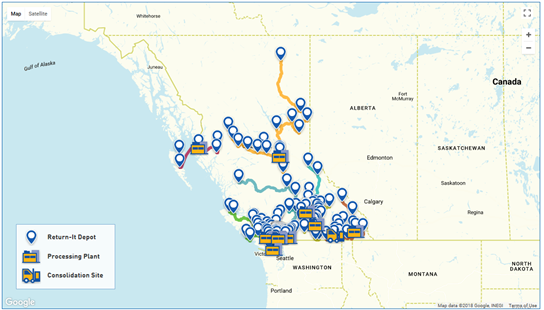
Note: Map outlines collection, transportation, and processing for all commodities except glass.
Routes between depots and their respective processors are indicated in colour.
For detailed location search, please visit return-it.ca/locations.
Governance
Encorp recognizes that its responsibilities as an extended product stewardship requires a governance model that places great emphasis on high standards of accountability and transparency.
Board of Directors
Encorp’s nine-person Board of Directors is composed of nominees of the beverage and retail grocery industries as well as independent directors who have no connection with either industry. From the members, two directors are appointed by the Canadian Beverage Association, representing the major soft drink bottlers. One each is appointed by the Canadian Bottled Water Association, the Western Dairy Council and the Beverage Alcohol Containers Management Council of BC. Two are appointed by the Retail Council of Canada.
The role of the Board is to determine the company’s corporate strategy and policies, set objectives for the CEO, approve budgets and fees, and discharge its fiduciary obligations to the brand owners and other stakeholder groups. The Board provides oversight of Encorp’s operations through quarterly board meetings and an annual strategic planning session.
Board members are senior executives with a broad range of experience in business generally and product stewardship specifically. Board members serve on corporate committees, including the audit, governance, human resources and compensation committees. In accordance with company bylaws, the Governance and Audit committees are chaired by the unrelated directors.
Our Advisory Committee is independent of the Board, comprised of representatives of our diverse stakeholder groups, including depots, regional districts and local governments. The committee reviews our strategic and operating plans and our financial and operating results and can make recommendations to the Governance Committee and the Board.
Accountability
Encorp’s Board Manual for Directors codifies key practices for the Board, including terms of reference for the board, the chair, board members, board committees and the CEO. It includes a code of conduct for directors, including conflict of interest guidelines. Directors are required to review and sign the code of conduct annually. Encorp also use external reviews to assess its ongoing performance. These include annual financial and materials end-fate audits, regular Enterprise Risk Management reviews and reviews of its internal controls. Cybersecurity is also a particular area of focus for the Encorp Board and management over the past few years.
Transparency
Encorp provides a comprehensive public explanation of its operations through an annual report, extensive information on its website, as well as through its Advisory Committee and other methods. Its reporting exceeds regulatory requirements and is intended to provide as much information as possible to the general public and stakeholders.
Board of Directors
Dan Wong, Chair, Encorp Affiliation – Western Dairy Council
Committees –HR & Compensation Chair/Audit/Governance
John Irving, Encorp Affiliation – Unrelated Director
Committee – Governance Chair/HR & Compensation
Greg Wilson, Encorp Affiliation – Retail Council of Canada
Committee – Audit
John Nixon, Encorp Affiliation – Beverage Alcohol Containers Management Council of BC
Committees – Audit/Governance
Jim Goetz, Encorp Affiliation – Canadian Beverage Association
Committees – HR & Compensation/Governance
Lisa O’Hara, Encorp Affiliation – Unrelated Director
Committees – Audit Chair/HR & Compensation
Julie Dickson-Olmstead, Encorp Affiliation – Retail Council of Canada
Committees – HR & Compensation/Governance
Emil Joseph, Canadian Bottled Water Association
Committee – Audit
Neil Antymis, Encorp Affiliation – Canadian Beverage Association
Committee – Audit
Please click here for more details on the Advisory Committee
Organisation Chart
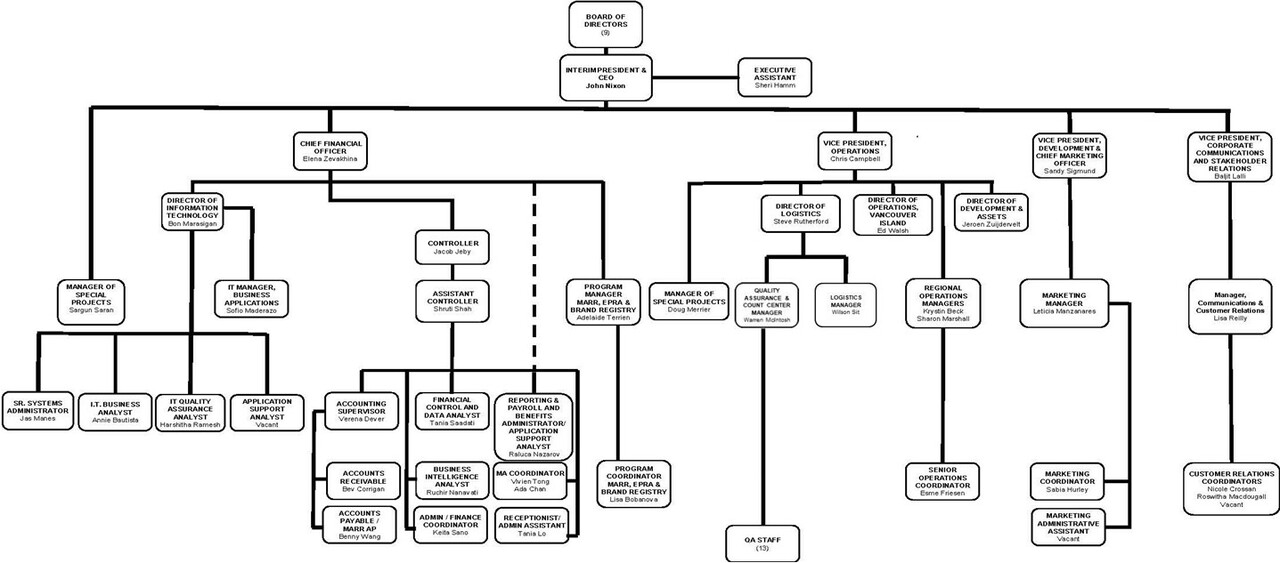
Encorp Strategic Goals
Four strategic goals underlie Encorp’s strategic plan. These drive the organization’s core activities and the strategic initiatives currently in progress or planned to be undertaken over the next four years:
- Continuously improve the recovery rate.
- Be efficient and cost effective while achieving our recovery rate goal.
- Protect and enhance BC’s Industry Product Stewardship model and the reputation of Encorp and extended producer responsibility generally.
- Use sound business practices.
There is a dynamic feedback between goals 1 and 2, and initiatives that are proposed or undertaken must be assessed for cost-effectiveness by management and, when appropriate, the Board, before and during implementation.
The organization’s strategic initiatives, as detailed in the strategic plan, flow directly from these goals. Corporate and individual performance metrics are in turn linked to the strategic initiatives. These include initiatives to increase recovery rates in the depot, public spaces and commercial/industrial sectors, to reduce the average cost per unit recovered and to ensure that internal systems remain robust and vigilant, as well as working with the Ministry of Environment and other stewardship agencies to enhance the overall system.
Regulatory Performance Metrics
Encorp exists to fulfill the regulatory obligations of the brand owners we represent under the Recycling Regulation of British Columbia. In the Regulation there are three high level performance metrics – consumer awareness of the program, consumer access to the program and recovery rate. In addition, by policy the Ministry requires a statement of environmental goals.
Encorp describes its targets and its plans to meet those targets in its Stewardship Plan, first approved by the Ministry of Environment in 2007 and reviewed and re-approved every five years. The draft objectives for the next five years are:
- Consumer Awareness – Continue to exceed a 95 percent awareness level as measured by a province-wide, statistically valid survey. Current awareness is 99 percent.
- Consumer Access – Maintain the current provincial coverage of free and convenient access to depot and return-to-retail access for over 99 percent of the provincial population.
- Recovery Rate – Grow to targets for the five years in the plan which are: 79.1%, 80.0%, 81.7%, 82.6%, 83.6%.
- Environmental Impacts – (1) Over the five-year period of the plan, reduce the total (direct and indirect) GHG CO2e generated, calculated on a per tonne collected basis. (2) Continue to report the annual net contribution to GHG CO2e reduction from our recycling activities using the EPA WARM model.

